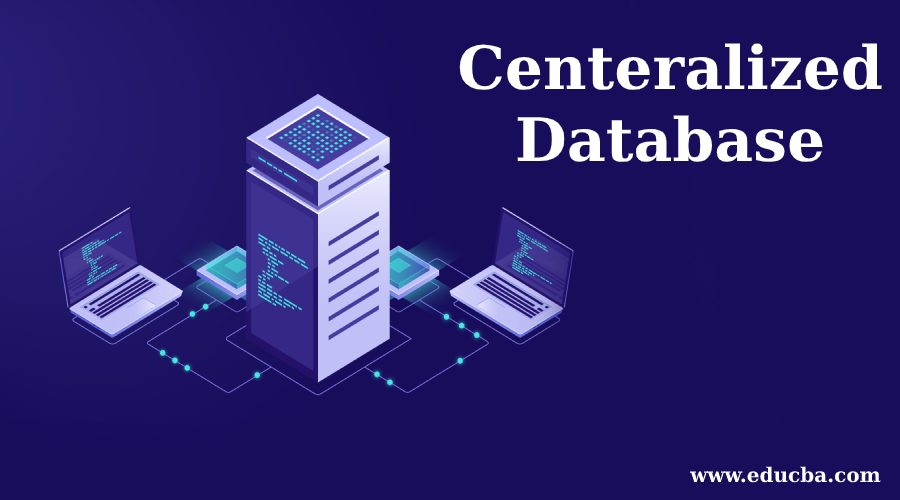Updated July 6, 2023

What is Centralized Database?
A Database can be in general defined as a collection of data that is organized efficiently so that the data can be retrieved and stored easily. A Database which is located and stored in a single location is called a Centralised Database. The centralized database’s location is generally a server CPU or desktop or the mainframe computer which is accessed by the users through a computer network like LAN or WAN.
Why do we Need a Centralized Database?
An organization may have several business processes running for various departments simultaneously. This may create issues if the organization wants to check on the data daily and the centralized database comes in handy in such cases. It is important for an organization to take decisions and without the presence of a centralized database, it becomes difficult. Because the organizations though have separate databases for different departments, they still need to maintain a centralized database where these separate databases are united to form a single database in order to provide the overall view of the complete data. For example, if the organization wants to find the details about a particular employee, they just need to access the centralized database to get all the details about the employee. So a centralized database not only helps in getting the information quicker with more ease but also helps in taking the business decisions as well. The usage of the Centralised Database ensures the security of the data, ease of accessing data from one place as well as providing a complete view of the data effectively reducing the extra layer of information.
Functions of a Centralized Database
The large organizations use Centralized Database so that the data can be available at a single place which will improve their decision making process. The basic function of a Centralised Database is to have a complete view of the data of the organization. Having a complete view of data reduces the time consumption in implementing the actions as the organizations do not have to analyze the data separately for various departments. Another function of the Centralised Database is that it can be managed easily than the distributed database systems. Also the Centralised Databases do not have the complexity in the design of the system like the distributed databases.
Advantages and Disadvantages
The various advantages and disadvantages of the centralized database are as below:
Advantages
Some of the advantages are:
- One of the many advantages of a Centralised Database is to ensure that the redundancy in data is minimized. As the data does not get scattered across the various locations and it is stored at one place, it can easily be seen that the redundant data does not exist.
- Centralized Database ensures a higher level of security. There are certain protocols established for the people associated or working with the data. So that the access of the data can be monitored and it reduces the amount of data leakage which in turn increases the data security.
- The usage of a Centralised Database increases the integrity of data. The data is present at one physical location which makes the organization of the data easier and this ensures that the data is consistent and correct.
- The Centralised Database consumes less power and maintenance, so it is cost effective.
- As the data is available in one place, the single point of entry for the data is established which makes the implementation of the changes in data at once rather than implementing the changes multiple times.
- The usage of a Centralised Database also increases the efficiency in the operation. For example, as the data is controlled by a central business unit, the resources used previously for data management can be utilized for other business areas.
- Centralized Database becomes very useful in case of projects where people from various functions are involved. In such a case, the centralized database helps in removing any barrier of communication among the various teams as it removes the many layers of data and presents the data of the organization in one place. Also with the presence of a centralized database, the sharing of ideas across the teams becomes even more flexible.
- The usage of a Centralised Database increases the efficiency of the organizations as it helps in keeping focus on the goal. Also, it helps the organizations making decisions quickly and implementing their strategies faster as the layers of data are reduced which also reduces the time consumption for the analysis of the data.
Disadvantages
With the above advantages, the centralized database also has certain drawbacks as below:
- Centralized Database may reduce the efficiency of the system in case of multiple users trying to access the data simultaneously as the data is present at one location. There may be the issue of traffic for the accessing of data from the Centralised Database.
- Another important issue that might generate from using the Centralised Database is data loss. As the data is present at one location, in case of any failure if the database is lost, and if there is no provision for back up, there is always the risk of losing the data. This might create an outage for a long time and the organization loses access to the data which will impact the business negatively.
- If there is any issue with the accuracy of the data, it will affect the organization because in case of any wrong data present in the database, the cost of correcting the data becomes more.
Recommended Articles
This is a guide to Centralized Database. Here we also discuss the introduction and functions of a centralized database along with advantages and disadvantages. You may also have a look at the following articles to learn more –
